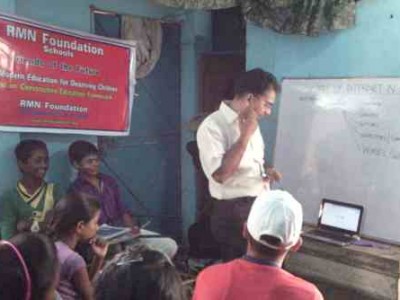
How to Prepare for the IIT Entrance Examination

Prakash Javadekar lighting the lamp at the inauguration of the IIT-Goa, at Farmagudi, in Ponda, Goa on July 30, 2016
Prakash Javdekar, the Minister for Human Resource Development in India, inaugurated Indian Institute of Technology (IIT), Goa on Saturday, July 30th.
The newly set up IIT Goa will function from a temporary campus at Goa Engineering College, Farmagudi and will be mentored by IIT Mumbai.
Speaking on the occasion, the Minister mentioned about the IIT-PAL platform in which prospective IIT students can be coached from professors across the country through online, TV, and other new media so that they can prepare for the IIT Entrance Examination.
[ Also Read: RMN Foundation Report on School Education ]
The Minister also mentioned how the IITs can use Government of India’s Uchhatar Avishkar Yojana (UAY) in which industries can give specific research request to IITs and co-partner in technological development.
Javdekar also commented on Global Initiative of Academic Networks (GIAN) in which the best practices of foreign countries can be implemented in India through idea exchange.
He emphasised on Innovation, Make in India, and promised that Government will extend all support in making IITs as the Start Up hubs.
The campus for the Indian Institute of Technology Goa (IIT Goa) will be developed at Loliem, a town in Canacona taluka in the southernmost tip of Goa.
[ Need to Improve Quality of School Education: New CBSE Chairman ]
The interim campus of IIT Goa is located at Goa Engineering College (GEC) at Farmagudi, which is about 78 km away from the proposed IIT Goa Campus site.
According to the government, the temporary campus of IIT Goa at GEC is fully equipped with class rooms, laboratories and modern hostel buildings. This campus is expected to serve the needs of IIT Goa for the first couple of years.
The Indian Institutes of Technology (IITs) are autonomous public institutes of higher education in India. They are governed by the Institutes of Technology Act, 1961 which lists 17 institutes located at Chennai, Delhi, Dhanbad, Guwahati, Kanpur, Kharagpur, Mumbai, Roorkee, Bhubaneswar, Gandhinagar, Hyderabad, Indore, Jodhpur, Mandi, Patna, Ropar, and Varanasi.
[ शिक्षा का सुधार: आईये सुने अरविन्द केजरीवाल जी के मन की बात ]
Each IIT is an autonomous institution, linked to the others through a common IIT Council, which oversees their administration. The Union HRD Minister is the ex-officio chairperson of IIT Council.
The IITs have a common admission process for undergraduate admissions, called IIT-JEE, which was replaced by Joint Entrance Examination Advanced in 2013.
The post-graduate level program that awards M.Tech, MS degrees in engineering is administered by the older IITs (Kharagpur, Bombay, Madras, Kanpur, Delhi, Dhanbad, Roorkee, Varanasi, Guwahati). M.Tech and MS admissions are done on the basis of Graduate Aptitude Test in Engineering (GATE).
In addition to B.Tech, M.Tech, and MS programs, IITs also award other graduate degrees such as M.Sc. in Maths, Physics, and Chemistry, MBA, Ph.D., etc. Admission to these programs of IITs is done through Common Admission Test (CAT), Joint Admission Test for Masters (JAM) and Common Entrance Examination for Design (CEED).
Photo courtesy: Press Information Bureau


